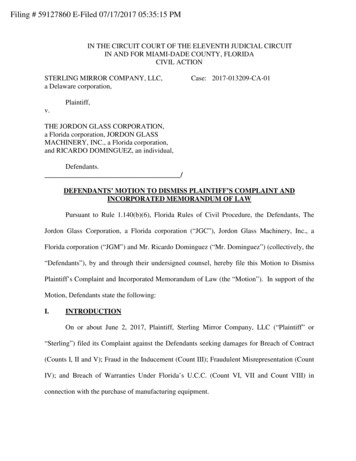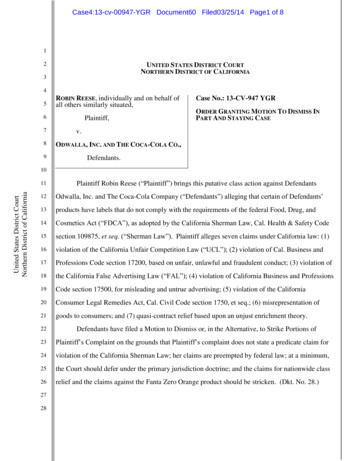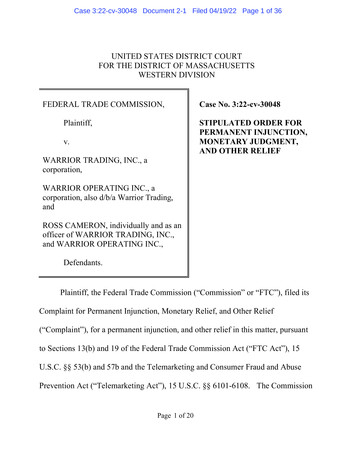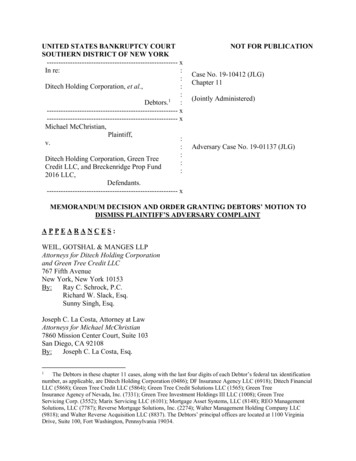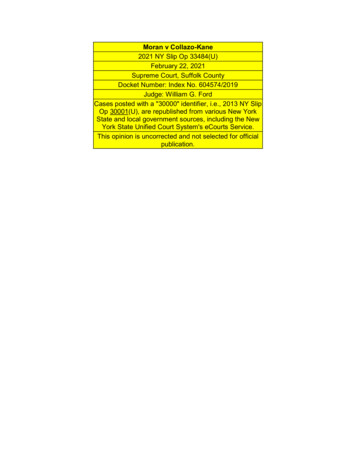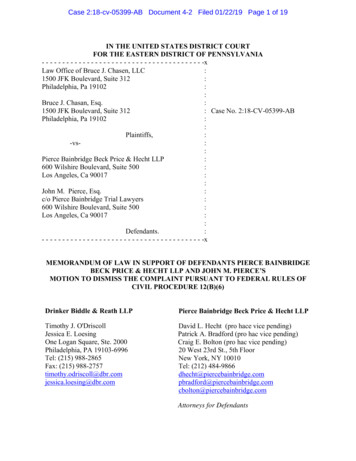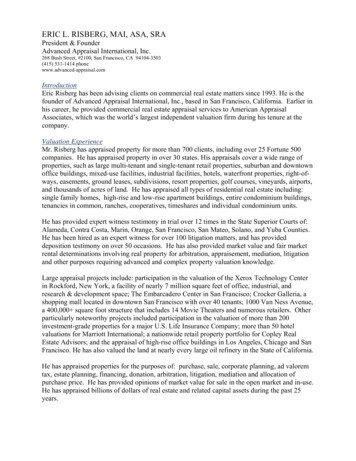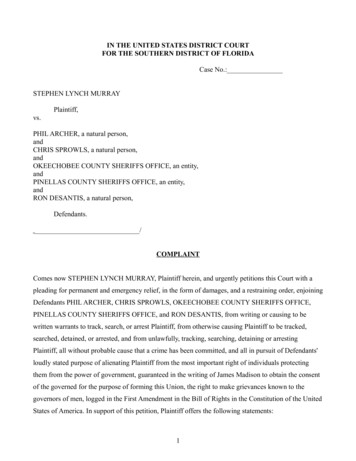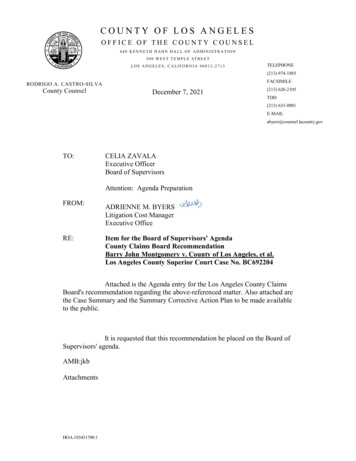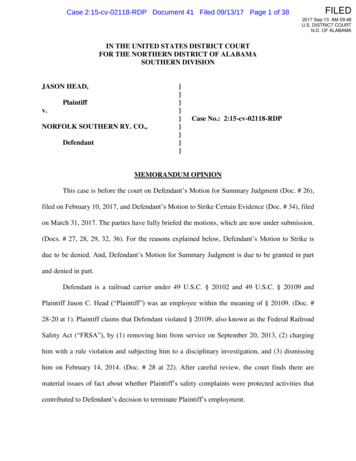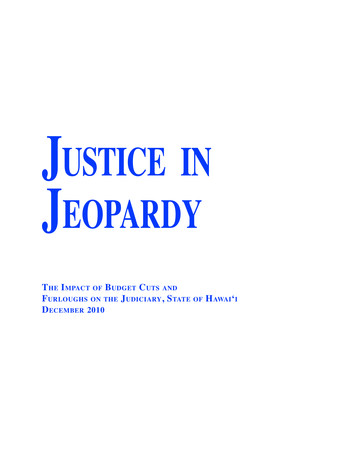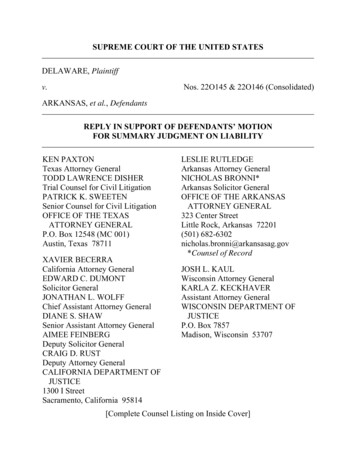
Transcription
SUPREME COURT OF THE UNITED STATESDELAWARE, PlaintiffNos. 22O145 & 22O146 (Consolidated)v.ARKANSAS, et al., DefendantsREPLY IN SUPPORT OF DEFENDANTS’ MOTIONFOR SUMMARY JUDGMENT ON LIABILITYKEN PAXTONTexas Attorney GeneralTODD LAWRENCE DISHERTrial Counsel for Civil LitigationPATRICK K. SWEETENSenior Counsel for Civil LitigationOFFICE OF THE TEXASATTORNEY GENERALP.O. Box 12548 (MC 001)Austin, Texas 78711XAVIER BECERRACalifornia Attorney GeneralEDWARD C. DUMONTSolicitor GeneralJONATHAN L. WOLFFChief Assistant Attorney GeneralDIANE S. SHAWSenior Assistant Attorney GeneralAIMEE FEINBERGDeputy Solicitor GeneralCRAIG D. RUSTDeputy Attorney GeneralCALIFORNIA DEPARTMENT OFJUSTICE1300 I StreetSacramento, California 95814LESLIE RUTLEDGEArkansas Attorney GeneralNICHOLAS BRONNI*Arkansas Solicitor GeneralOFFICE OF THE ARKANSASATTORNEY GENERAL323 Center StreetLittle Rock, Arkansas 72201(501) 682-6302nicholas.bronni@arkansasag.gov*Counsel of RecordJOSH L. KAULWisconsin Attorney GeneralKARLA Z. KECKHAVERAssistant Attorney GeneralWISCONSIN DEPARTMENT OFJUSTICEP.O. Box 7857Madison, Wisconsin 53707[Complete Counsel Listing on Inside Cover]
LESLIE RUTLEDGEArkansas Attorney GeneralDANA NESSELMichigan Attorney GeneralKEN PAXTONTexas Attorney GeneralTIM FOXMontana Attorney GeneralXAVIER BECERRACalifornia Attorney GeneralDOUG PETERSONNebraska Attorney GeneralSTEVE MARSHALLAlabama Attorney GeneralAARON D. FORDNevada Attorney GeneralMARK BRNOVICHArizona Attorney GeneralWAYNE STENEHJEMNorth Dakota Attorney GeneralPHILLIP J. WEISERColorado Attorney GeneralDAVE YOSTOhio Attorney GeneralASHLEY MOODYFlorida Attorney GeneralMIKE HUNTEROklahoma Attorney GeneralLAWRENCE WASDENIdaho Attorney GeneralELLEN F. ROSENBLUMOregon Attorney GeneralCURTIS T. HILL, JR.Indiana Attorney GeneralALAN WILSONSouth Carolina Attorney GeneralTOM MILLERIowa Attorney GeneralSEAN REYESUtah Attorney GeneralDEREK SCHMIDTKansas Attorney GeneralMARK HERRINGVirginia Attorney GeneralANDY BESHEARKentucky Attorney GeneralBOB FERGUSONWashington Attorney GeneralJEFF LANDRYLouisiana Attorney GeneralPATRICK MORRISEYWest Virginia Attorney GeneralBRIAN FROSHMaryland Attorney GeneralBRIDGET HILLWyoming Attorney GeneralCounsel for Defendant States in Case No. 22O146JOSH L. KAULWisconsin Attorney GeneralCounsel for Wisconsin in Case No. 22O145
TABLE OF CONTENTSINTRODUCTION .1ARGUMENT .2I. All of MoneyGram’s Official Check products fall within theFDA’s broad term “money order.” .3II. Alternatively, MoneyGram Agent Checks and Teller’s Checksfall within the FDA’s catchall “other similar writteninstrument” provision. .5A. Official Checks are “other similar written instrument[s].” .61. Delaware cannot demonstrate why Official Checks falloutside the “other similar written instrument” provision. .62. Congress’s explicitly stated purposes for the FDAconfirm that Official Checks are “other similar writteninstrument[s].” .9B. MoneyGram is “directly liable” on its Official Checks. .121. “Directly liable” under the FDA refers to the partyultimately responsible for payment on an instrument. .122. Direct liability under the FDA does not refer toconcepts of unconditional liability under the U.C.C.15C. No plausible interpretation of “third party bank check”applies to MoneyGram Official Checks. .18III. The FDA requires escheatment of MoneyGram Official Checksto the State of purchase. .20CONCLUSION .22CERTIFICATE OF SERVICE .25i
TABLE OF AUTHORITIESCasesAIG Baker Sterling Heights, LLC v. Am. Multi-Cinema, Inc.,508 F.3d 995 (11th Cir. 2007) .17Alabama v. North Carolina,560 U.S. 330 (2010) .2Anderson v. Liberty Lobby, Inc.,477 U.S. 242 (1986). .2Beach Commc’ns, Inc. v. FCC,965 F.2d 1103 (D.C. Cir. 1992) .11Beard v. Rowan,34 U.S. 301 (1835) .10Burrage v. United States,571 U.S. 204 (2014) .16Center Video Indus. Co. v. Roadway Package Sys.,90 F.3d 185 (7th Cir. 1996) .7Citicorp v. Interbank Card Ass’n,478 F. Supp. 756 (S.D.N.Y. 1979) .7Corning Glass Works v. Brennan,417 U.S. 188 (1974) .17Delaware v. New York,507 U.S. 490 (1993) .15DePierre v. United States,564 U.S. 70 (2011) .3FCC v. Beach Commc’ns, Inc.,508 U.S. 307 (1993) .11Hall v. Hall,138 S. Ct. 1118 (2018) .17Imports, Etc., Ltd. v. ABF Freight Sys.,162 F.3d 528 (8th Cir. 1998) .7Matsushita Elec. Indus. Co. v. Zenith Radio Corp.,475 U.S. 574 (1986) .2ii
McDermott Int’l, Inc. v. Wilander,498 U.S. 337 (1991) .6New Prime Inc. v. Oliveira,139 S. Ct. 532 (2019) . 3, 19Pennsylvania v. New York,407 U.S. 206 (1972) . 11, 15Price v. Forrest,173 U.S. 410 (1899) .10Rousey v. Jacoway,544 U.S. 320 (2005) .7Rubin v. United States,449 U.S. 424 (1981) .13Sable Commc’ns of Cal., Inc. v. FCC,492 U.S. 115 (1989) .11Travelers Express Co. v. Minnesota,506 F. Supp. 1379 (D. Minn. 1981) . 13, 20, 21, 22Turner Broad. Sys. v. FCC,512 U.S. 622 (1994) .11United Sav. Ass’n of Tex. v. Timbers of Inwood Forest Assocs., Ltd.,484 U.S. 365 (1988) .10United States v. Raynor,302 U.S. 540 (1938) .6United States v. Spatig,870 F.3d 1079 (9th Cir. 2017) .15United States v. Thwaites Place Assocs.,548 F. Supp. 94 (S.D.N.Y. 1982) .18United States v. U.S. Gypsum Co.,438 U.S. 422 (1978) .14Univ. of Tex. Sw. Med. Ctr. v. Nassar,570 U.S. 338 (2013) .16W. Union Tel. Co. v. Pennsylvania,368 U.S. 71 (1961) .15iii
Statutes & Rules12 U.S.C.§ 2501. passim§ 2502.13§ 2503. passimAct of Oct. 28, 1974, Pub. L. 93-495, 88 Stat. 1500 .10Fed. R. Civ. P. 56 .2Other Legislative MaterialsS. 1895, 93d Cong. (1973) .10S. 2705, 93d Cong. (1974) .10S. Rep. No. 93-505 (1973) . 13, 19119 Cong. Rec. 17,046 (May 29, 1973).10120 Cong. Rec. 4,528 (Feb. 27, 1974) .11Uniform Acts & CodesUniform Commercial Code (Am. Law Inst. & Unif. Law Comm’n 2017)§ 3-104(f) .4§ 3-104(g).4§ 3-104(h).4§ 3-104(i) .5§ 3-104 cmt. 4 . 3, 4, 5§ 3-105(c) .20Revised Uniform Disposition of Unclaimed Property Act(Unif. Law Comm’n 1966) . 12, 13, 14, 15Uniform Unclaimed Property Act(Unif. Law Comm’n 1995) .21Other AuthoritiesAband. Prop. Law, § 300, Subd. 1, Par. (c) & § 301,1946 N.Y. Op. Atty. Gen. No. 141,1946 WL 49892 (Dec. 23, 1946) .13Felix Frankfurter, Some Reflections on the Reading of Statutes,47 Colum. L. Rev. 527 (1947) .17iv
William D. Hawkland, American Travelers Checks,15 Buff. L. Rev. 501 (1966).8Richard A. Lord, Williston on Contracts(4th ed. Nov. 2018 update) .5Antonin Scalia & Bryan A. Garner, Reading Law (2012) . 10, 17Joseph Story, Commentaries on the Constitution of the United States(The Lawbook Exchange, Ltd. photo. reprt. 2005) (2d ed. 1851) .10v
INTRODUCTIONCongress enacted the FDA because it found that unclaimed-propertylaw had become inequitable and a burden on interstate commerce. In theirtwo prior briefs, Defendant States have explained how this case presents thatsame inequity Congress intended to fix in 1974: The proceeds from unclaimed MoneyGram Retail Money Orders and Agent Check Money Ordersescheat pursuant to Congress’s remedial plan to distribute that money to theStates in which those instruments were purchased—i.e., where the owner islikely to reside. But MoneyGram Agent Checks and Teller’s Checks escheatto only one State, Delaware, even though those instruments share the samerelevant characteristics as money orders (and traveler’s checks, for that matter).Rather than explain how this situation comports with Congress’splan—let alone equity—Delaware argues that the Special Master shouldwholly ignore the FDA’s stated purposes, which Congress enacted into lawand codified as 12 U.S.C. § 2501. That ask, while incredible, is in fact consistent with Delaware’s fundamental misunderstanding that the “question ofwhat property is covered by the FDA . . . is not a determination illuminatedby, or even addressed by, unclaimed property law.” Del. Resp. Br., Doc. No.97 at 32. In other words, Delaware admits that its argument depends on ignoring unclaimed-property law while reading an unclaimed-property statute.This disregard for the FDA’s plain text and context permeates Delaware’s response. For example, instead of explaining why certain types ofMoneyGram Official Checks do not meet the FDA’s definition of “moneyorder”—which even Delaware’s authorities agree is a broad term—Delawareattempts to improperly narrow that definition. Worse still, Delaware’s proposed definition is based not on the characteristics of money orders in themarket when Congress enacted the FDA but on the characteristics of the products that MoneyGram today chooses, for its own business reasons, to marketas MoneyGram “Money Orders.” Such self-definition cannot justify departing from Congress’s remedial plan.Delaware’s other arguments are susceptible to similar criticisms.Whether or not MoneyGram Official Checks are money orders, they at thevery least fall within § 2503’s coverage of “other similar written instrument[s](other than a third party bank check) on which a banking or financial organization or a business association is directly liable.” To fall within the FDA’s1
coverage of “other similar written instrument[s],” Official Checks need onlyto share relevant characteristics with money orders and traveler’s checks—namely that they are prepaid, cash-equivalent instruments for transmittingmoney to a named payee, for which records regarding their purchasers are nottypically maintained. It is beside the point that MoneyGram Agent Checksand Teller’s Checks are not identical to MoneyGram Retail Money Orders,Agent Check Money Orders, or any other type of money order. That the FDAcovers such diverse items as both money orders and traveler’s checks provesthis point.Again ignoring the text and context of the FDA, Delaware asks the Special Master to cast aside the technical meaning of “directly liable” that theterm had acquired in unclaimed-property law in the years leading up to theFDA’s enactment. But the context leaves no doubt that Congress used “directly liable” as an established term of art with that technical meaning. Andwhen it comes to arguing that certain Official Checks fall within the FDA’sexclusion of “third party bank check[s],” Delaware continues to promote anunderstanding of this term that its own expert refuted.Because Defendant States have established that the FDA’s escheatmentrules apply to MoneyGram Agent Checks and Teller’s Checks in addition toMoneyGram Agent Check Money Orders and Retail Money Orders—and because none of Delaware’s arguments in response persuasively account for theFDA’s text or context—the Special Master should recommend that the Courtgrant Defendant States’ motion for summary judgment and deny Delaware’sconcurrently filed motion.ARGUMENTDelaware attempts to couch some of its arguments about the appropriate legal standard under 12 U.S.C. § 2503 in factual terms. But all of the“facts that might affect the outcome” of the § 2503 inquiry come from thedocuments produced and the testimony offered by MoneyGram in this matter.Anderson v. Liberty Lobby, Inc., 477 U.S. 242, 248 (1986). Therefore, regarding this inquiry there is not even “metaphysical doubt as to the materialfacts.” Matsushita Elec. Indus. Co. v. Zenith Radio Corp., 475 U.S. 574, 586(1986). And because those undisputed material facts show that DefendantStates are “‘entitled to a judgment as a matter of law,’” granting them “summary judgment is appropriate” regarding Delaware’s liability to them underthe FDA. Alabama v. North Carolina, 560 U.S. 330, 344 (2010) (quoting Fed.R. Civ. P. 56(a)).2
I.All of MoneyGram’s Official Check products fall within the FDA’sbroad term “money order.”Because all MoneyGram Official Checks are “money order[s]” underthe FDA, that law’s escheatment rules apply to MoneyGram Agent Checksand Teller’s checks, in addition to MoneyGram Agent Check Money Orders.See Defs. Opening Br., Doc. No. 89 at 21–25. Sources contemporaneous withthe FDA’s enactment in 1974 broadly defined “money order” as a prepaiddraft issued by a post office, bank, or other entity used by the purchaser totransmit money to a named payee. See Defs. Opening Br. 21–22; Defs. Resp.Br., Doc. No. 100 at 2–3; see also Del. Resp. Br. 11 n.4. Modern sourcesdefine “money order” with similar breadth. See U.C.C. § 3-104 cmt. 4 (Am.Law Inst. & Unif. Law Comm’n 2017) (noting that money orders “are soldboth by banks and non-banks” and “vary in form”); see App. 881–82 (GilletteRep. ¶¶ 11–13) (discussing both personal and bank money orders, definingthem simply as “prepaid draft[s], or payment order[s], that the seller providesto a purchaser in a specified amount that is typically imprinted on the face”).Given that broad definition of the term “money order,” all of MoneyGram’sOfficial Checks fit comfortably within the FDA. See Defs. Opening Br. 22–25; Defs. Resp. Br. 2–10.None of Delaware’s arguments for narrowing that term is persuasive.These arguments ignore the Supreme Court’s insistence that broad statutoryterms should be given appropriately broad interpretations. When Congresshas “adopt[ed] a statutory term” that is “broad enough” to “encompass allforms” of a problem, the Court will interpret that term broadly, at least “[i]nthe absence of any indication in the statutory text that Congress intended” tonarrow that term. DePierre v. United States, 564 U.S. 70, 85 (2011). BecauseCongress chose to use a flexible term (“money order”) in the FDA, the Courtwill interpret that term flexibly.Delaware’s contrary understanding of the statutory term “money order”rests on the flawed premise that MoneyGram’s decisions today about how todesign and label its money-order products establish what Congress meant in1974 when it included the term “money order” in the FDA. See Del. OpeningBr., Doc. No. 79 at 16–22; Defs. Resp. Br. 2–10. Delaware’s reliance onMoneyGram’s proprietary decisions is contrary to the “fundamental canon ofstatutory construction that words generally should be interpreted as takingtheir ordinary meaning at the time Congress enacted the statute.” New PrimeInc. v. Oliveira, 139 S. Ct. 532, 539 (2019) (quotation marks and ellipses3
omitted) (quoting Wis. Cent. Ltd. v. United States, 138 S. Ct. 2067, 2074(2018)). There is no reason to presume that MoneyGram’s product choicestoday affect the definition of a 45-year-old statutory term.Besides, Delaware does not explain why the purported distinctions thatit identifies (between MoneyGram Retail Money Orders and Agent CheckMoney Orders on the one hand, and other types of MoneyGram OfficialChecks on the other) place certain Official Checks beyond the reach of thestatutory term “money order.” See Del. Resp. Br. 11–13. Defendant Statesaddressed most of these points in their brief opposing Delaware’s motion forsummary judgment. See Defs. Resp. Br. 4–10, 15. To these repeated points,Delaware now adds that because “MoneyGram Official Checks [presumablyreferring to MoneyGram Agent Checks and Teller’s Checks] are signed by afinancial institution employee rather than the purchaser,” they are not moneyorders. Del. Resp. Br. 13. But Delaware offers no authority for the proposition that money orders, by definition, must not be signed by a financial-institution employee. Nor could it—the U.C.C. expressly comprehends that amoney order can also be a teller’s check, which would be signed by a financial-institution employee. See U.C.C. § 3-104(h) & cmt. 4.It does not undermine the consensus definition of “money order” topoint out that cashier’s checks or teller’s checks “would fall squarely into”that definition. Del. Resp. Br. 10. The U.C.C. recognizes that money orders“vary in form and their form determines how they are treated in Article 3.”U.C.C. § 3-104 cmt. 4. It also requires that, if money orders take the form ofteller’s checks, then the rules for teller’s checks apply; the same principlewould govern money orders that take the form of cashier’s checks. See id.§ 3-104(g) & cmt. 4. But that does not mean all money orders and all cashier’schecks may “be used interchangeably in transactions.” Del. Resp. Br. 10; seeid. at 14–15, 39 (making similar arguments). An instrument that qualifies asa cashier’s check, teller’s check, or any other U.C.C.-defined instrument doesnot lose that qualification by virtue of also falling within the umbrella term“money order.” See U.C.C. § 3-104(f) (“An instrument may be a check eventhough it is described on its face by another term, such as ‘money order.’”);see also Del. Resp. Br. 11 n.4 (discussing an American Bankers Associationpublication that distinguishes between “personal money order[s]” and moneyorders that are “an official instrument of the bank”). Like other authorities,the U.C.C. acknowledges the elasticity of the term “money order.”4
Delaware is also wrong that reading the term “money order” to includeall Official Checks would render the FDA’s reference to traveler’s checks orany other part of the FDA superfluous. See Del. Resp. Br. 8–10. Cruciallyhere, Delaware misunderstands the definition of “traveler’s check.” Traveler’s checks are indeed prepaid instruments used by the purchaser to transmitmoney to a named payee. See U.C.C. § 3-104(i) (defining “traveler’s check”).But not all traveler’s checks are drafts. The U.C.C. makes clear that traveler’schecks “may be in the form of a note or draft.” Id. § 3-104 cmt. 4 (emphasisadded); see Richard A. Lord, 22 Williston on Contracts § 60.3 (4th ed. Nov.2018 update) (“Like money orders, traveler’s checks are issued both by banksand other entities. However, unlike money orders, they may be in the form ofa note or draft.”). So notes that resemble, but are not, traveler’s checks couldfall within the “other similar written instrument” provision but not the definition of “money order.”Notwithstanding Delaware’s unpersuasive attempts to narrow the term“money order” as used by Congress in the FDA, the Special Master shouldconclude that all MoneyGram Official Checks fall within that term.II.Alternatively, MoneyGram Agent Checks and Teller’s Checks fallwithin the FDA’s catchall “other similar written instrument” provision.Regardless of whether all Official Checks are “money order[s],” theFDA’s reach does not end with the definition of “money order.” MoneyGramAgent Checks and Teller’s Checks undoubtedly share the same relevant characteristics as money orders (most notably, MoneyGram Agent Check MoneyOrders) and traveler’s checks for the purposes of the FDA.The FDA applies to any “money order, traveler’s check, or other similarwritten instrument (other than a third party bank check) on which a bankingor financial organization or a business association is directly liable.” 12U.S.C. § 2503. Delaware makes three key mistakes in seeking to avoid the“other similar written instrument” provision. First, Delaware misunderstandsthe characteristics of MoneyGram Agent Checks and Teller’s Checks thatmake them “other similar written instrument[s]” to which the FDA applies,just like MoneyGram Agent Check Money Orders. See Del. Resp. Br. 38–46.Second, Delaware disregards the contemporaneous evidence demonstratingthat Congress used the term “directly liable” to invoke established principlesfrom unclaimed-property law. See id. at 16–38. Finally, Delaware continuesto advocate for an interpretation of “third party bank check” that even its own5
retained expert on the field of payment systems did not find convincing. Seeid. at 46–53. Whether or not MoneyGram Agent Checks and Teller’s Checksare “money order[s],” they are at a minimum “other similar written instrument[s]” to which the FDA’s escheatment rules apply.A.Official Checks are “other similar written instrument[s].”Defendant States’ prior briefs explain the relevant similarities betweenmoney orders, traveler’s checks, and all MoneyGram Official Checks: Theyare all prepaid instruments used to transmit funds to a named payee that areconsidered in the market to be cash equivalents or “as good as cash.” SeeDefs. Opening Br. 26–29; Defs. Resp. Br. 11–13. Additionally, the books andrecords of MoneyGram do not show the last-known addresses of the purchasers of Official Checks. See Defs. Opening Br. 6–16, 26–27; Defs. Resp. Br.12–13. Delaware’s contrary arguments attempt to demonstrate a lack of similarity by showing that Official Checks are not identical to money orders.“Similarity is not identity,” however, but only the “resemblance between different things.” United States v. Raynor, 302 U.S. 540, 547 (1938); see Defs.Resp. Br. 11–12. Compared to money orders and traveler’s checks, OfficialChecks are “other similar written instrument[s]” to which the FDA applies,even if they are not identical to those enumerated instruments. 12 U.S.C.§ 2503.As an initial matter, Delaware suggests that there is a factual disputeabout whether Official Checks are similar to money orders and traveler’schecks. See Del. Resp. Br. 38–39. But Delaware’s argument focuses insteadon the appropriate standard for interpreting the statutory term “other similarwritten instrument.” Id. at 40–45. Whenever a case asks “the court to definethe statutory standard,” that is “a question of law.” McDermott Int’l, Inc. v.Wilander, 498 U.S. 337, 356 (1991). Interpreting the scope of the term “othersimilar written instrument” does not require the Special Master to resolve anyfactual disputes.1.Delaware cannot demonstrate why Official Checks fall outsidethe “other similar written instrument” provision.Moving on to the term’s scope, Delaware faults Defendant States foremphasizing the prepaid nature of both money orders and traveler’s checks.Del. Resp. Br. 40–43. But even Delaware agrees that money orders, traveler’schecks, and Official Checks are prepaid instruments for transmitting funds.Del. Resp. Br. 40. And as Defendant States explained in their response to6
Delaware’s summary-judgment motion, the term “other similar written instrument” captures instruments that share the common characteristics of the enumerated items, money orders and traveler’s checks. See Defs. Resp. Br. 11–12 (discussing Rousey v. Jacoway, 544 U.S. 320, 329, 331–32 (2005)).The focus of the analysis on the common characteristics of money orders and traveler’s checks demonstrates the most fundamental flaw in Delaware’s attempt to show that MoneyGram Agent Checks and Teller’s Checksare not “other similar written instrument[s].” All of Delaware’s arguments inthis portion of its brief focus exclusively on the supposed distinctions betweenmoney orders and the Official Checks at issue, Agent Checks and Teller’sChecks. See Del. Resp. Br. 38–46. Delaware’s arguments entirely ignore theother category of instruments enumerated in the FDA—traveler’s checks.Delaware never attempts to examine what characteristics traveler’s checksand money orders share, nor whether MoneyGram Agent Checks and Teller’sChecks also share those characteristics. Because, as Defendant States havepreviously explained, all of MoneyGram’s Official Check products have therelevant characteristics shared by both money orders and traveler’s checks,Delaware fails to place MoneyGram Agent Checks and Teller’s Checks beyond the reach of the “other similar written instrument” provision.Those common characteristics of money orders, traveler’s checks, andOfficial Checks are that they all are prepaid instruments used for transmittingfunds. See Defs. Resp. Br. 11–12; see also Center Video Indus. Co. v. Roadway Package Sys., 90 F.3d 185, 189–90 (7th Cir. 1996) (interpreting contractthat covered “cash, a cashier’s check, a certified check, a money order, or asimilar instrument” to apply to “institutionally guaranteed instrument wheremoney has already been paid or set aside, securing the instrument” (emphasisadded)). In other words, the key shared characteristic of money orders andtraveler’s checks is that their prepaid nature makes them marketable as cashequivalents. See Center Video, 90 F.3d at 190 (“An ordinary check, on theother hand, is ‘payable on demand’ only if the account drawn upon has sufficient funds to cover the amount of the check at the time of demand.”); see alsoImports, Etc., Ltd. v. ABF Freight Sys., 162 F.3d 528, 530 (8th Cir. 1998)(discussing how prepaid instruments function, including that a “customer provides payment to the bank for [a] cashier’s check at the time the bank issuesthe check”); Citicorp v. Interbank Card Ass’n, 478 F. Supp. 756, 760(S.D.N.Y. 1979) (referring to traveler’s checks as “the virtual equivalent ofmoney” (i.e., cash), in part because they are prepaid); William D. Hawkland,7
American Travelers Checks, 15 Buff. L. Rev. 501, 501 (1966) (recounting19th-century creation of “a ne
SUPREME COURT OF THE UNITED STATES DELAWARE, Plaintiff v. Nos. 22O145 & 22O146 (Consolidated) ARKANSAS, et al., Defendants REPLY IN SUPPORT OF DEFENDANTS' MOTION FOR SUMMARY JUDGMENT ON LIABILITY KEN PAXTON
